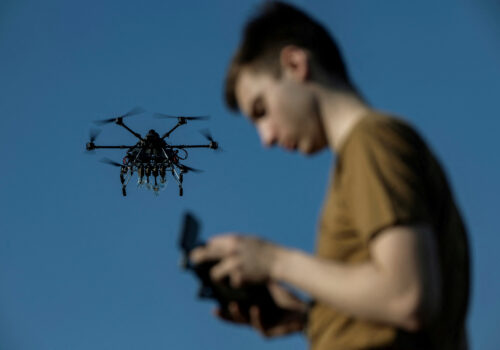The recent conflict between Israel and Iran has shaken Middle Eastern security assumptions and set the stage for new strategic alignments across the region. Amid escalating threats and shifting power dynamics, the United States and Gulf nations have moved swiftly to fortify a different kind of alliance; one anchored not in oil prices or arms sales, but in cooperation to develop and implement cutting-edge technologies.
This emerging US-Gulf tech partnership is not only a response to regional instability, but also a platform for global influence. For Ukraine, it presents a strategically exciting opportunity to deepen engagement with both Washington and the Gulf nations, while also advancing the country’s own recovery and integration into established international innovation networks.
Stay updated
As the world watches the Russian invasion of Ukraine unfold, UkraineAlert delivers the best Atlantic Council expert insight and analysis on Ukraine twice a week directly to your inbox.
The Gulf’s recalibration following the unprecedented recent escalation in hostilities between Israel and Iran has reinforced the urgency of technological self-sufficiency and digital resilience. From Riyadh to Abu Dhabi, national strategies such as Saudi Vision 2030 and the UAE’s AI agenda are gaining new importance.
The United States, meanwhile, is seeking reliable partners to counter the rise of authoritarian tech ecosystems led by China, Russia, and Iran. These converging interests are creating a new basis for cooperation that is focused on issues such as semiconductors, AI, cybersecurity, energy transition, and space innovation.
The current shift has potentially long-lasting geopolitical implications. In contrast to China’s closed and tightly state-controlled tech model, the US-Gulf partnership emphasizes transparency, interoperability, and market access.
The Gulf’s geographic position and capital resources make it an ideal hub for restructured supply chains and next-generation infrastructure. In this context, the recent Israel-Iran conflict has served as both catalyst and justification for deeper American-Gulf integration, particularly in terms of dual-use technologies with civilian and defense applications.
For Ukraine, the relevance of this rapidly evolving geopolitical landscape is immediate and multi-dimensional. Ukrainian battlefield-tested technologies in electronic warfare, counter-drone systems, and cyber defense all directly address the concerns of Gulf nations regarding growing regional threats.
Meanwhile, Ukraine’s agritech innovation can support Gulf food security strategies in what are increasingly arid environments. The country’s globally respected software talent and cybersecurity expertize can also offer value to American firms operating in the Gulf.
Eurasia Center events

Looking ahead, the convergence of US innovation, Gulf investment, and Ukrainian resilience could become an attractive blueprint for Kyiv’s postwar recovery. Ukraine’s reconstruction is set to be one of the largest rebuilding efforts of the twenty-first century. This unprecedented rebuilding process can serve as a real-world testbed for smart infrastructure, digital services, and clean energy systems co-developed by Ukrainians together with partners in the US and the Gulf region.
To take full advantage of this moment, Ukraine must adopt a targeted strategy. First, the country should identify the most strategically attractive niche sectors including cybersecurity, agritech, and defense tech. These should be areas where Ukraine’s assets complement rather than compete with American and Gulf priorities.
Second, Ukraine must invest in human capital by expanding tech education and exchange programs that connect Ukrainian talent with innovation centers in the Gulf and the United States. Thirdly, Kyiv should position itself as a proactive contributor to this emerging innovation bloc, not just as a beneficiary of international aid but as a co-creator of strategic value.
Recent shifts in the geopolitical landscape of the Middle East have accelerated existing global divisions in terms of both technology and security. The US-Gulf alliance is emerging as a stabilizing force, grounded in shared values and mutual technological ambition. Through focused engagement and smart positioning, Ukraine can become an indispensable partner in this alliance, and can help shape a more secure and innovative global future.
Anatoly Motkin is president of StrategEast, a non-profit organization with offices in the United States, Ukraine, Georgia, Kazakhstan, and Kyrgyzstan dedicated to developing knowledge-driven economies in the Eurasian region.
Further reading
The views expressed in UkraineAlert are solely those of the authors and do not necessarily reflect the views of the Atlantic Council, its staff, or its supporters.

The Eurasia Center’s mission is to enhance transatlantic cooperation in promoting stability, democratic values, and prosperity in Eurasia, from Eastern Europe and Turkey in the West to the Caucasus, Russia, and Central Asia in the East.
Follow us on social media
and support our work
Image: IMAGO/robertharding via Reuters Connect




